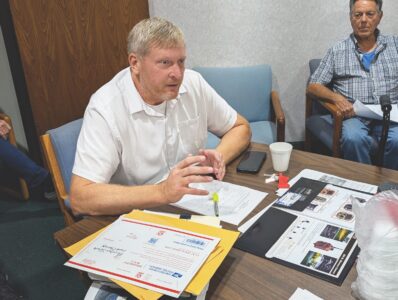Washington County public transit program shares updates
Washington County’s public transit program is drawing more riders, cutting wait times, and lowering costs, but leaders say funding gaps remain as the system continues its first full year under a new on-demand model.
Dawn Rauch of Washington-Morgan County Community Action told city officials that July ridership totaled more than 1,500 trips, including 396 in Marietta’s Ward 1, 209 in Ward 2, 195 in Ward 3 and 416 in Ward 4. Another 161 riders came in from the county. Walmart remains one of the top destinations.
The service runs Monday through Friday from 7 a.m. to 5 p.m. and Saturdays from 8 a.m. to 1 p.m. Riders can call dispatch at 740-373-7671 or use the CTS Rider Portal app to book trips. Fares are $1 one way within the city and $2 one way into the county, with seniors and people with disabilities paying half fare. All vehicles are handicap accessible.
“I think it gives people independence,” Rauch said. “Washington County is a very large county, so transportation has always been a barrier to getting services. This program is countywide and open to anyone, so we’re trying to remove that barrier.”
Local officials noted that the average wait time for a ride has dropped from 45 minutes to about 10 minutes. The program has also reduced fuel use, vehicle maintenance costs, and the number of complaint calls to City Hall.
“When there is no system, the phone calls to City Hall were nonstop,” said Director of Public Safety and Service Steve Wetz. “Once that whole program changed, our phone calls have stopped. It’s been a huge success.”
According to officials, the system is operating with about $150,000 less than what was requested from the state. Washington County contributes about $55,000 annually, while the city put in $40,000 in Community Development Block Grant funding and another $30,000 from its general fund. State and federal funds, along with Medicaid contracts for non-emergency medical trips, cover the balance.
New vehicles are also on the way. Four minivans will be added to the fleet by the end of the year, replacing older models. The fleet currently includes four larger buses and several minivans, all wheelchair accessible.



